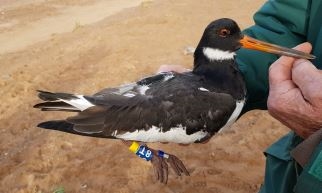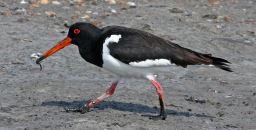Things didn’t exactly go to plan for the planned cannon net catch on the weekend of 10-11 November. After delaying from the Saturday due to severe weather and a failed fire on Sunday, we reset and assembled a slightly smaller team to try again on Monday.
 Oystercatcher with GPS tagWe did catch 53 Oystercatchers - a reasonable sample of birds - considering there were still problems with the firing system or fuses. All, including an old 'wasp' ringed retrap, were metal ringed and colour-ringed. Most importantly, 10 GPS tags were deployed and birds will be out there now collecting data. A fix on their exact position will be recorded and stored on the tag until it comes into contact with the base station, when it will download all the stored data.
Oystercatcher with GPS tagWe did catch 53 Oystercatchers - a reasonable sample of birds - considering there were still problems with the firing system or fuses. All, including an old 'wasp' ringed retrap, were metal ringed and colour-ringed. Most importantly, 10 GPS tags were deployed and birds will be out there now collecting data. A fix on their exact position will be recorded and stored on the tag until it comes into contact with the base station, when it will download all the stored data.
Arrangements are being made to position the base station receivers, and a schedule for data retrieval is being established. In addition to the yellow un-coded ring above the blue coded ring on right tarsus, the GPS-tagged birds carry an blue un-coded ring above the metal ring on the left tarsus. Any sightings of any colour-ringed birds, and especially the GPS tagged birds can be emailed to This email address is being protected from spambots. You need JavaScript enabled to view it..
Massive thanks are due to everyone who turned out over the two days and in particular to Steve Ayres and Sama Euridge for helping us take kit down and to Stephen Edwards for helping us move kit off again. The support from Teignbridge District Council, despite having to deal with the erosion issues caused by the storm, has been very welcome. Thanks also to Jon Langmead and the staff at the Warren Golf Club for allowing us access through their course.
